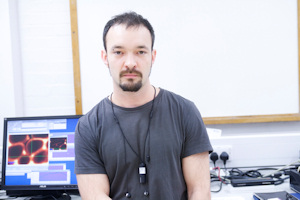Graphene research lands one of 2013 top 10 physics breakthroughs
13 Dec 2013
Research by a University of Manchester scientist has been included in the top 10 breakthroughs in physics in 2013, as judged by Physics World magazine.

Dr Roman Gorbachev was highly commended for research he and his team carried out the first measurement of Hofstadter's butterfly in a solid-state system.
The recognition, jointly awarded to Philip Kim of Columbia University and Pablo Jarillo-Herrero and Ray Ashoori at the Massachusetts Institute of Technology, was part of research Dr Gorbachev was leading combining graphene with other 2D materials.
The groups demonstrated that graphene, when combined with materials such as boron nitride, paves the way for vast new areas of scientific discovery and previously unheard-of applications.
The top spot in the list was taken by the IceCube South Pole Neutrino Observatory for making the first observations of cosmic neutrinos.
Hamish Johnston, editor of physicsworld.com said: "The ability to detect cosmic neutrinos is a remarkable achievement that gives astronomers a completely new way of studying the cosmos.
"The judges of the 2013 award were also impressed with the IceCube collaboration's ability to build and operate a huge and extremely sensitive detector in the most remote and inhospitable place on Earth."
Dr Gorbachev added: "It is a great honour for our work to be included in the top 10 physics breakthroughs of the year, and is testament to the curiosity-driven science we undertake at The University of Manchester.
"Catching the elusive butterfly is something we were very excited about, but more importantly, our work showed that we are now able to build up a principally new kind of materials by stacking individual atomic planes in a desired sequence."
The top 10 breakthroughs identified in the list were chosen by the Physics World editorial team, who reviewed over 350 news articles about advances in the physical sciences published on physicsworld.com in 2013.
The award was founded in 2009. Last year's winner was the ATLAS and CMS collaborations at CERN for their joint discovery of a Higgs-like particle at the Large Hadron Collider.
